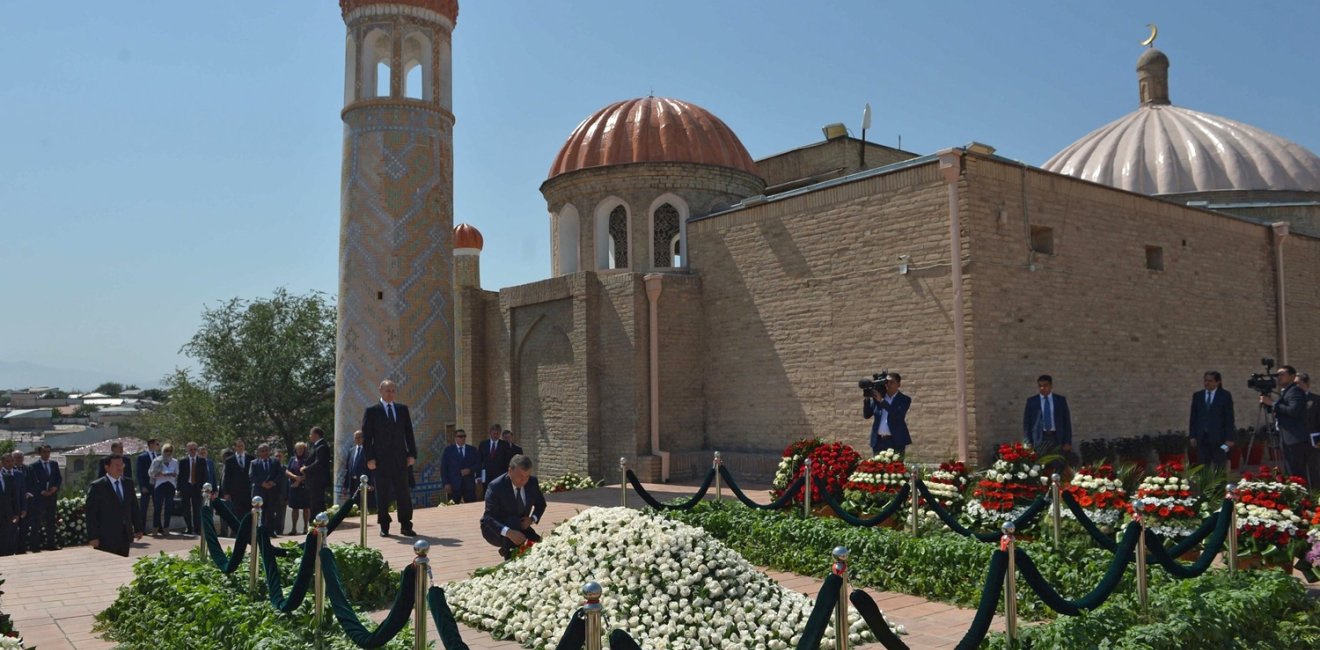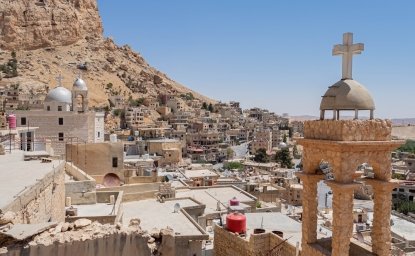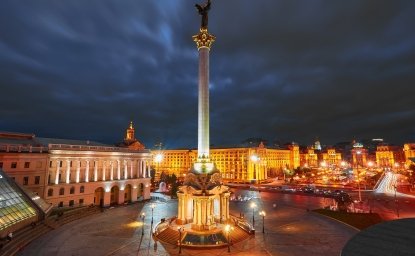The death of Uzbekistan’s authoritarian president, Islam Karimov, 78, on September 3 marked the end of an era. Karimov was one of only two remaining Central Asian leaders whose rule began during the Soviet period.
Strategic significance
Why should the U.S. pay close attention to Uzbekistan? With a population of 30 million, Uzbekistan is Central Asia’s most populous state, possesses Central Asia’s largest army, shares a border with Afghanistan, and interacts with multiple international institutions. Uzbekistan has cooperated with NATO since the early 1990s and maintains membership in the Partnership for Peace program. This strategically located country hosted the U.S. Air Force and Marine Corps base at Karshi-Khanabad from 2001 to 2005, but closed the base after U.S. criticism over Tashkent’s massacre of hundreds of peaceful protestors in the Fergana Valley city of Andijan. Uzbekistan is a member of the CIS and the Shanghai Cooperation Organization, which means that it falls at the crossroad of Russian and Chinese influences. The U.S. has diplomatic, cultural, and military ties to Uzbekistan’s neighbors (Kazakhstan, Kyrgyzstan, and Turkmenistan).
The region as a whole is one to watch. More political transitions are expected since there are aging leaders in both Kazakhstan (Nursultan Nazarbayev, 76) and Tajikistan (Emomali Rahmon, 64).
The post-Karimov era
Having ruled for 27 years, Karimov is the only leader known to the 45 percent of Uzbekistan’s population under the age of 30. Still, observers do not fear major instability since there is a great deal of interest in seeing continuity in Uzbek politics. Karimov’s passing marks leadership change but not regime change.
On August 28 the government made public that Karimov was ill, an unusual announcement because the aged leader’s health was treated as a virtual state secret. But the celebration of Uzbekistan’s 25th anniversary of independence from the Soviet Union on August 31, 2016 would have forced officials to account for his absence anyway because Karimov had always overseen the festivities.
Laura Adams, a Democracy Fellow at the Institute of International Education, explains the lack of information this way: “Official silence in the aftermath of a major event is the modus operandi in Uzbekistan. State television did not mention the 2010 overthrow of Kyrgyzstan’s president until two weeks after it happened.… However, people can’t fail to have noticed that there was no Independence Day concert on August 31 and that Karimov’s traditional speech for that event was given by a newscaster reading from his desk.”
The region as a whole is one to watch. More political transitions are expected since there are aging leaders in both Kazakhstan (Nursultan Nazarbayev, 76) and Tajikistan (Emomali Rahmon, 64).
Despite ongoing speculation about the succession, Karimov, who had no sons or obvious close lieutenants, never designated an heir. Thus, when the initial rumors of his stroke broke, there was a great deal of conjecture as to who might inherit the leadership and how the transition would take place. For years it was thought that Karimov was grooming his eldest daughter, Gulnara, to take over, much as Azerbaijan’s Ilham Aliyev took over after the death of his father, Heydar Aliyev. But Gulnara was placed under house arrest two years ago after becoming involved in an international corruption scandal. She was not even allowed to attend her father’s funeral, though her sister, Lola, and her mother did attend.
As analysts of the region worked to put the situation in context, the “post-Karimov” era was declared, marked by the urgent question of who would take the reins of power. Who might succeed Karimov has long been an important topic of academic analysis. However, there has been little opportunity to discuss it openly inside Uzbekistan.
To understand power in Uzbekistan, it is important to appreciate an individual’s position in the regime and his clan affiliation. Since the creation of Uzbekistan in the twentieth century (first at the Uzbek Soviet Socialist Republic, in 1924, and then in 1991 as the independent Republic of Uzbekistan), power in Uzbekistan has surrounded “clans” or informal identity networks. According to Kathleen Collins of the University of Minnesota, these networks are based on “kinship or such fictive ties as friends, villages, mahallas (neighborhoods) and even university or businesses in urban areas.” Building on these connections or on patron-client relations, individuals promote each other in political and economic opportunities. “The [security services] also act something like clans, having a strong personalistic basis. The term [clan] is used loosely in Uzbekistan (as opposed to Kyrgyzstan where actual kinship is a much bigger factor), mostly to refer to political cliques, but ones that have long-standing personal connections behind them.” In Uzbekistan, clans may correspond to such geographic locations as Samarkand or Jizzakh region, but influence derives from personal networks and contacts, not unlike the situation that obtains in Russia and other former Soviet spaces.
Clan interests are economic interests, and these overlap with state concerns. Economic interests, for example, mean that those vested in the system will want to see the status quo maintained. As Eric McGlinchey writes, “Uzbek political elites have an incentive to maintain Karimov’s patronage- and rent-based autocracy.” This is because “the Uzbek ruling class, this interdependent triangle of security services, local elites, and central elites, has a strong incentive to maintain the autocratic regime that is the wellspring of financial wealth.”[1] Interested groups will demand continuity under the next president.
Karimov’s successor
The transition to an interim president was smooth and swift. Karimov likely died some time before his death was publicly announced. Negotiations over the transfer of power took place behind closed doors.
On September 8, Uzbekistan’s parliament named Prime Minister Shavkat Mirziyoyev, 59, acting president. Mirziyoyev comes from Jizzakh region where he was governor, just north of Karimov’s Samarkand region, a source of the former president’s support. Mirziyoyev was also governor of Samarkand region and is supported by the clans of both regions. He has led the government for the past 13 years, appointing individuals from his network all around the country. He oversaw Karimov’s funeral, which since Soviet times has been an indicator of who will next take charge. Because Mirziyoyev has supported closer ties with Russia, he is believed to be favored for the succession by the Kremlin. Moreover, Mirziyoyev met with both Putin, who visited Uzbekistan last week to lay flowers on Karimov’s grave, and with Russian prime minister Dmitry Medvedev, who attended Karimov’s funeral.
Tashkent has pledged to hold presidential elections on December 4 of this year, within the three-month window allocated for in the Uzbek constitution. Mirziyoyev is expected to be elected. Mirziyoyev has the support of the speaker of the senate, Nigmatulla Yuldashev, to whom power should have passed according to the constitution.
The National Security Council, the successor to the KGB, has been led by Rustam Inoyatov, 72, since 1995. Although his advanced age may have played a role in precluding him from taking over the presidency, his role as head of the security services means that whoever is in control needs him at least in the short term. It remains to be seen whether Mirziyoyev will rely on him for support or dispose of him, similar to the way Turkmenistan’s second president, Gurbanguly Berdimuhamedow, eliminated the security chief, Akmyrat Rejepow, who was widely influential. Berdimuhamedow used him to become the president and then arrested him.
Uzbekistan’s foreign policy interests
Because of Uzbekistan’s strategic location and rich endowment of natural resources (hydrocarbons, gold, cotton), it is and will remain a locus of interest to Russia and China, as well as to the West. Karimov was keenly aware of this external focus on his country and designed his own foreign policy around it: by connecting Uzbekistan to each of the major powers through his various military and economic agreements, he minimized the chances that he could be cornered by any one great power. His successor will face the challenge of both maintaining internal order and holding demanding neighbors at bay.
Will Mirziyoyev reorient Uzbekistan toward Russia? According to Paul Stronski of the Carnegie Endowment for International Peace, Washington, D.C., Mirziyoyev may be “more palatable to the Russian leadership, but that does not mean ‘pro-Russia.’” Moreover, does being “pro-Russia” mean actually joining Russia-led organizations, such as the Collective Security Treaty Organization or the Eurasian Economic Union, or does it simply mean having an accommodating relationship with Moscow? It is too early to tell.
Whatever Uzbekistan’s relationship with Russia turns out to be, it is likely to have little effect on the lives of ordinary Uzbek citizens. Under the new administration human rights are unlikely to change. There is no incentive to disrupt corruption schemes, and many Uzbeks still think that stability that keeps the country from dissolving into the disorder seen in Tajikistan or Afghanistan is worth pursuing, even if it means an autocratic government.
One important indicator that Mirziyoyev will maintain the current power structures and elite access to resources came in his speech to the joint session of the Legislative Chamber and Senate, in which he indicated that he would uphold Karimov’s most basic policies. In that speech he stated that he hoped “mutual and constructive cooperation” would continue.[2]
Conclusion
At least to this point, Uzbekistan has experienced a smooth transition to a new leader after the death of President Islam Karimov. While many, including those specializing in the region, thought that Karimov’s death could lead to instability, the events in Uzbekistan so far indicate another peaceful change of leadership in the former Soviet space. Questions remain about precisely who will stay in government after the December elections. However, it is clear that Shavkat Mirziyoyev is currently in control. Mirziyoyev has the support of at least two regional clans and has held a position in state government, both of which place a person within reach of power in Uzbekistan.
The opinions expressed here are solely those of the author.
[1] Eric McGlinchey, “Leadership Succession, Great Power Ambitions, and the Future of Central Asia,” Central Asian Affairs 3 (2016): 209-225.
[2] “Vystuplenie Prem’er-ministra Respubliki Uzbekistan Shavkata Miromonovicha Mirziyoyeva na sovmestnom zasedanii Zakonodatel’noi palaty i Senata Olii Majlisa,” Pravitel’stvennyi portal Respubliki Uzbekistan, September 8, 2016, https://www.gov.uz/ru/news/view/7247 (accessed September 14, 2016).






